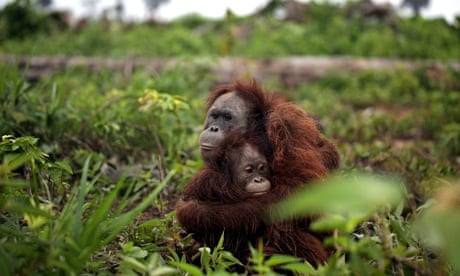WWF International, the world's largest conservation group, has been accused of "selling its soul" by forging alliances with powerful businesses which destroy nature and use the WWF brand to "greenwash" their operations.
The allegations are made in an explosive book previously barred from Britain. The Silence of the Pandas became a German bestseller in 2012 but, following a series of injunctions and court cases, it has not been published until now in English. Revised and renamed Pandaleaks, it will be out next week.
Its author, Wilfried Huismann, says the Geneva-based WWF International has received millions of dollars from its links with governments and business. Global corporations such as Coca-Cola, Shell, Monsanto, HSBC, Cargill, BP, Alcoa and Marine Harvest have all benefited from the group's green image only to carry on their businesses as usual.
Huismann argues that by setting up "round tables" of industrialists on strategic commodities such as palm oil, timber, sugar, soy, biofuels and cocoa, WWF International has become a political power that is too close to industry and in danger of becoming reliant on corporate money.
"WWF is a willing service provider to the giants of the food and energy sectors, supplying industry with a green, progressive image … On the one hand it protects the forest; on the other it helps corporations lay claim to land not previously in their grasp. WWF helps sell the idea of voluntary resettlement to indigenous peoples," says Huismann.
WWF's conservation philosophy has changed considerably in 50 years, but until recently it was widely thought that people and wildlife could not live together, which led to the group being accused of complicity in evictions of indigenous peoples from Indian and African forests.
The book also argues that WWF, which was set up by Prince Philip and Prince Bernhart of the Netherlands in 1961, runs an elite club of 1,001 of the richest people in the world, whose names are not revealed. Industrialists, philanthropists and ultra-conservative, upper-class naturalists, they are said to make up an "old boys' network with influence in the corridors of global and corporate and policy-making power".
Names of the members that have slipped out over the years include Baron von Thyssen, Fiat boss Gianni Agnelli, and Henry Ford, as well as corrupt politicians such as Mobutu Sese Seko of Zaire, the former president of the International Olympic Committee Juan Samaranch, and beer baron Alfred Heineken.
"The '1001 club' is still important for the WWF, even though it's not a secret central committee. I hate conspiracy theories, but I'm convinced that the discreet '1001 club' still influences the strategic decisions of the WWF, because many of its members are important players in global and powerful financial and industrial corporations that rule the planet," Huismann told the Observer.
Pandaleaks also attacks the WWF's loose relationship with the energy industry. Its first corporate sponsor was Shell, one of whose presidents also served as president of WWF. The organisation has said recently that it is phasing out donations from fossil fuel companies, but this is not complete and in 2010 it was paid by Shell and BP to study which forests in the southern hemisphere should be retained and where land could be cleared for industrial use.
The WWF maintains that the environment can only be protected in dialogue with people involved in extractive and polluting industries. "Pandaleaks is the book of a discredited German television documentary that disregarded most of the basic norms and standards of journalism. It is not factual and does not present a representative picture of WWF," said a spokesman.
"WWF would hope to exercise some political influence in the interests of its members and the causes we espouse. We seek to strategically engage industry, as industry has major environmental impacts.
"We don't believe we 'sold our soul' at any point, but it is true that we are now much choosier about which interests we accept donations from and which interests we work with. We are in the final stages of a several year project upgrading our global transparency and accountability standards for business partnerships."The spokesman also defended the organisation's record in relation to energy companies such as Shell and on the relocation of indigenous peoples. "Globally, WWF was actively exiting relationships with fossil fuel companies more than a decade ago. Less than 10% [of income] came from corporates in 2013. For WWF International, the proportion of corporate funding was 6% in 2013. WWF still has the '1001 club', as one of a number of vehicles for donations to WWF International.
"In India, there were forced relocations, but WWF-India always opposed these and worked on seeing that forest peoples who entered voluntary relocation agreements didn't get deprived of legal rights or cheated."
Under its first president, Prince Bernhart, the WWF is said to have wanted to set up a massive national park stretching from South Africa to Kenya. The book, which draws on evidence given to a South African judicial commission in 1996, says an SAS veteran led a team of British mercenaries to South Africa in 1989 to train anti-poaching units to combat rhino poachers and dealers. The operation, which failed, was said to have been part-funded by Prince Bernhard. An investigation into the affair by Prince Philip found that no WWF funds were used.
It also documents how Prince Philip, the first president of WWF in Britain, shot a tiger in Ranthambhore tiger park in India shortly before the group was founded. In an interview with Huismann, Philip said: "I have never been big game hunting. No, never, except that one time in India. The only way you can be sure of getting a reasonable wildlife population is by making sure that they are balanced. You can't just leave it to nature."

Comments (…)
Sign in or create your Guardian account to join the discussion